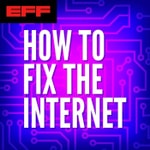How to Fix the Internet – Détails, épisodes et analyse
Détails du podcast
Informations techniques et générales issues du flux RSS du podcast.

How to Fix the Internet
Electronic Frontier Foundation (EFF)
Fréquence : 1 épisode/29j. Total Éps: 62

Classements récents
Dernières positions dans les classements Apple Podcasts et Spotify.
Apple Podcasts
🇩🇪 Allemagne - technology
31/07/2025#100🇺🇸 États-Unis - technology
31/07/2025#76🇫🇷 France - technology
31/07/2025#52🇺🇸 États-Unis - technology
27/07/2025#100🇫🇷 France - technology
27/07/2025#66🇨🇦 Canada - technology
24/07/2025#72🇨🇦 Canada - technology
23/07/2025#48🇺🇸 États-Unis - technology
23/07/2025#95🇨🇦 Canada - technology
22/07/2025#44🇺🇸 États-Unis - technology
22/07/2025#100
Spotify
Aucun classement récent disponible
Liens partagés entre épisodes et podcasts
Liens présents dans les descriptions d'épisodes et autres podcasts les utilisant également.
See all- https://www.hubspot.com/
631 partages
- http://dig.ccmixter.org/files/djlang59/37792
47 partages
- https://twitter.com/doctorow
30 partages
- https://twitter.com/gigibsohn
1 partage
- https://twitter.com/musajumana
1 partage
Qualité et score du flux RSS
Évaluation technique de la qualité et de la structure du flux RSS.
See allScore global : 79%
Historique des publications
Répartition mensuelle des publications d'épisodes au fil des années.
Rerelease - So You Think You're a Critical Thinker
Saison 5
vendredi 11 octobre 2024 • Durée 43:51
This episode was first released on March 21, 2023.
The promise of the internet was that it would be a tool to melt barriers and aid truth-seekers everywhere. But it feels like polarization has worsened in recent years, and more internet users are being misled into embracing conspiracies and cults.
From QAnon to anti-vax screeds to talk of an Illuminati bunker beneath Denver International Airport, Alice Marwick has heard it all. She has spent years researching some dark corners of the online experience: the spread of conspiracy theories and disinformation. She says many people see conspiracy theories as participatory ways to be active in political and social systems from which they feel left out, building upon beliefs they already harbor to weave intricate and entirely false narratives.
Marwick speaks with EFF’s Cindy Cohn and Jason Kelley about finding ways to identify and leverage people’s commonalities to stem this flood of disinformation while ensuring that the most marginalized and vulnerable internet users are still empowered to speak out.
In this episode you’ll learn about:
- Why seemingly ludicrous conspiracy theories get so many views and followers
- How disinformation is tied to personal identity and feelings of marginalization and disenfranchisement
- When fact-checking does and doesn’t work
- Thinking about online privacy as a political and structural issue rather than something that can be solved by individual action
Alice Marwick is director of research at Data & Society. Previously she was an Associate Professor in the Department of Communication and cofounder and Principal Researcher at the Center for Information, Technology and Public Life at the University of North Carolina, Chapel Hill. She researches the social, political, and cultural implications of popular social media technologies. In 2017, she co-authored Media Manipulation and Disinformation Online (Data & Society), a flagship report examining far-right online subcultures’ use of social media to spread disinformation, for which she was named one of Foreign Policy magazine’s 2017 Global Thinkers. She is the author of Status Update: Celebrity, Publicity and Branding in the Social Media Age (Yale 2013), an ethnographic study of the San Francisco tech scene which examines how people seek social status through online visibility, and co-editor of The Sage Handbook of Social Media (Sage 2017). Her forthcoming book, The Private is Political (Yale 2023), examines how the networked nature of online privacy disproportionately impacts marginalized individuals in terms of gender, race, and socio-economic status. She earned a political science and women's studies bachelor's degree from Wellesley College, a Master of Arts in communication from the University of Washington, and a PhD in media, culture and communication from New York University.
This podcast is licensed Creative Commons Attribution 4.0 International, and includes the following music licensed Creative Commons Attribution 3.0 Unported by their creators:
http://dig.ccmixter.org/files/djlang59/59729
Probably Shouldn’t by J.Lang (c) copyright 2012 Licensed under a Creative Commons Attribution (3.0) license. Ft: Mr_Yesterday
__________________________________
http://dig.ccmixter.org/files/airtone/58703
CommonGround by airtone (c) copyright 2019 Licensed under a Creative Commons Attribution (3.0) Ft: simonlittlefield
__________________________________
Additional beds and alternate theme remixes by Gaëtan Harris
Fighting Enshittification
Saison 5 · Épisode 10
mardi 2 juillet 2024 • Durée 39:15
The early internet had a lot of “technological self-determination" — you could opt out of things, protect your privacy, control your experience. The problem was that it took a fair amount of technical skill to exercise that self-determination. But what if it didn’t? What if the benefits of online privacy, security, interoperability, and free speech were more evenly distributed among all internet users?
This is the future that award-winning author and EFF Special Advisor Cory Doctorow wants us to fight for. His term “enshittification” — a downward spiral in which online platforms trap users and business customers alike, treating them more and more like commodities while providing less and less value — was selected by the American Dialect Society as its 2023 Word of the Year. But, he tells EFF’s Cindy Cohn and Jason Kelley, enshittification analysis also identifies the forces that used to make companies treat us better, helping us find ways to break the cycle and climb toward a better future.
In this episode you’ll learn about:
- Why “intellectual property” is a misnomer, and how the law has been abused to eliminate protections for society
- How the tech sector’s consolidation into a single lobbying voice helped bulldoze the measures that used to check companies’ worst impulses
- Why recent antitrust actions provide a glimmer of hope that megacompanies can still be forced to do better for users
- Why tech workers’ labor rights are important to the fight for a better internet
- How legislative and legal losses can still be opportunities for future change
Cory Doctorow is an award-winning science fiction author, activist, journalist and blogger, and a Special Advisor to EFF. He is the editor of Pluralistic and the author of novels including “The Bezzle” (2024), “The Lost Cause” (2023), “Attack Surface” (2020), and “Walkaway” (2017); young adult novels including “Homeland” (2013) and “Little Brother” (2008); and nonfiction books including “The Internet Con: How to Seize the Means of Computation” (2023) and “How to Destroy Surveillance Capitalism” (2021). He is EFF's former European director and co-founded the UK Open Rights Group. Born in Toronto, Canada, he now lives in Los Angeles.
Open Source Beats Authoritarianism
Saison 5 · Épisode 1
mardi 27 février 2024 • Durée 39:22
What if we thought about democracy as a kind of open-source social technology, in which everyone can see the how and why of policy making, and everyone’s concerns and preferences are elicited in a way that respects each person’s community, dignity, and importance?
This is what Audrey Tang has worked toward as Taiwan’s first Digital Minister, a position the free software programmer has held since 2016. She has taken the best of open source and open culture and successfully used them to help reform her country’s government. Tang speaks with EFF’s Cindy Cohn and Jason Kelley about how Taiwan has shown that openness not only works but can outshine more authoritarian competition, wherein governments often lock up data.
In this episode you’ll learn about:
- Using technology including artificial intelligence to help surface our areas of agreement, rather than to identify and exacerbate our differences
- The “radical transparency” of recording and making public every meeting in which a government official takes part, to shed light on the policy-making process
- How Taiwan worked with civil society to ensure that no privacy and human rights were traded away for public health and safety during the COVID-19 pandemic
- Why maintaining credible neutrality from partisan politics and developing strong public and civic digital infrastructure are key to advancing democracy.
Audrey Tang has served as Taiwan's first Digital Minister since 2016, by which time she already was known for revitalizing the computer languages Perl and Haskell, as well as for building the online spreadsheet system EtherCalc in collaboration with Dan Bricklin. In the public sector, she served on the Taiwan National Development Council’s open data committee and basic education curriculum committee and led the country’s first e-Rulemaking project. In the private sector, she worked as a consultant with Apple on computational linguistics, with Oxford University Press on crowd lexicography, and with Socialtext on social interaction design. In the social sector, she actively contributes to g0v (“gov zero”), a vibrant community focusing on creating tools for the civil society, with the call to “fork the government.”
Coming Soon: How to Fix the Internet Season Five
Saison 5
mardi 13 février 2024 • Durée 01:48
We cannot build a better future unless we can envision it. EFF’s How to Fix the Internet returns with another season full of inspiring conversations with some of the smartest and most interesting people around who are thinking about how to make the internet – and the world – a better place for all of us. Co-hosts Executive Director Cindy Cohn and Activism Director Jason Kelley will speak with people like journalist Kashmir Hill, Taiwan’s minister of digital affairs Audrey Tang, former White House advisor Tim Wu, digital artist Dr. Nettrice Gaskins and actor and filmmaker Alex Winter, among others.
It seems like everywhere we turn we see dystopian stories about technology’s impact on our lives and our futures — from tracking-based surveillance capitalism to street level government surveillance to the dominance of a few large platforms choking innovation to the growing pressure by authoritarian governments to control what we see and say — the landscape can feel bleak. Exposing and articulating these problems is important, but so is envisioning and then building a better future. That’s where our podcast comes in.
EFF's How to Fix the Internet podcast offers a better way forward. Through curious conversations with some of the leading minds in law and technology, we explore creative solutions to some of today’s biggest tech challenges.
Rerelease: Securing the Vote
Saison 4
mercredi 30 août 2023 • Durée 31:02
This episode was first published on May 24, 2022.
Pam Smith has been working to secure US elections for years, and now as the CEO of Verified Voting, she has some important ideas about the role the internet plays in American democracy. Pam joins Cindy and Danny to explain how elections can be more transparent and more engaging for all.
U.S. democracy is at an inflection point, and how we administer and verify our elections is more important than ever. From hanging chads to glitchy touchscreens to partisan disinformation, too many Americans worry that their votes won’t count and that election results aren’t trustworthy. It’s crucial that citizens have well-justified confidence in this pillar of our republic.
Technology can provide answers - but that doesn’t mean moving elections online. As president and CEO of the nonpartisan nonprofit Verified Voting, Pamela Smith helps lead the national fight to balance ballot accessibility with ballot security by advocating for paper trails, audits, and transparency wherever and however Americans cast votes.
On this episode of How to Fix the Internet, Pamela Smith joins EFF’s Cindy Cohn and Danny O’Brien to discuss hope for the future of democracy and the technology and best practices that will get us there.
In this episode you’ll learn about:
- Why voting online can never be like banking or shopping online
- What a “risk-limiting audit” is, and why no election should lack it
- Whether open-source software could be part of securing our votes
- Where to find reliable information about how your elections are conducted
Pamela Smith, President & CEO of Verified Voting, plays a national leadership role in safeguarding elections and building working alliances between advocates, election officials, and other stakeholders. Pam joined Verified Voting in 2004, and previously served as President from 2007-2017. She is a member of the National Task Force on Election Crises, a diverse cross-partisan group of more than 50 experts whose mission is to prevent and mitigate election crises by urging critical reforms. She provides information and public testimony on election security issues across the nation, including to Congress. Before her work in elections, she was a nonprofit executive for a Hispanic educational organization working on first language literacy and adult learning, and a small business and marketing consultant.
This podcast is supported by the Alfred P. Sloan Foundation's Program in Public Understanding of Science and Technology.
Music for How to Fix the Internet was created for us by Reed Mathis and Nat Keefe of BeatMower.
This podcast is licensed Creative Commons Attribution 4.0 International, and includes the following music licensed Creative Commons Attribution 3.0 Unported by their creators:
http://dig.ccmixter.org/files/Skill_Borrower/41751
Klaus by Skill_Borrower (c) copyright 2013 Licensed under a Creative Commons Attribution (3.0) license
—
http://dig.ccmixter.org/files/airtone/58703
commonGround by airtone (c) copyright 2018 Licensed under a Creative Commons Attribution Noncommercial (3.0) license.
—
http://dig.ccmixter.org/files/NiGiD/62475
Chrome Cactus by Martijn de Boer (NiGiD) (c) copyright 2020 Licensed under a Creative Commons Attribution Noncommercial (3.0) license.
Who Inserted the Creepy?
Saison 4 · Épisode 10
mardi 30 mai 2023 • Durée 34:36
Writers sit watching a stranger’s search engine terms being typed in real time, a voyeuristic peek into that person’s most private thoughts. A woman lands a dream job at a powerful tech company but uncovers an agenda affecting the lives of all of humanity. An app developer keeps pitching the craziest, most harmful ideas she can imagine but the tech mega-monopoly she works for keeps adopting them, to worldwide delight.
The first instance of deep online creepiness actually happened to Dave Eggers almost 30 years ago. The latter two are plots of two of Eggers’ many bestselling novels—“The Circle” and “The Every,” respectively—inspired by the author’s continuing rumination on how much is too much on the internet. He believes we should live intentionally, using technology when it makes sense but otherwise logging off and living an analog, grounded life.
Eggers — whose newest novel, “The Eyes and the Impossible,” was published this month — speaks with EFF’s Cindy Cohn and Jason Kelley about why he hates Zoom so much, how and why we get sucked into digital worlds despite our own best interests, and painting the darkest version of our future so that we can steer away from it.
In this episode, you’ll learn about:
- How that three-digit credit score that you keep striving to improve symbolizes a big problem with modern tech.
- The difficulties of distributing books without using Amazon.
- Why round-the-clock surveillance by schools, parents, and others can be harmful to kids.
- The vital importance of letting yourself be bored and unstructured sometimes.
Dave Eggers is the bestselling author of his memoir “A Heartbreaking Work of Staggering Genius” (2000) as well as novels including “What Is the What” (2006), “A Hologram for the King” (2012), “The Circle” (2013), and “The Every” (2021); his latest novel, “The Eyes and the Impossible,” was published May 9. He founded the independent publishing company McSweeney’s as well as its namesake daily humor website, and he co-founded 826 Valencia, a nonprofit youth writing center that has inspired over 70 similar organizations worldwide. Eggers is winner of the American Book Award, the Muhammad Ali Humanitarian Award for Education, the Dayton Literary Peace Prize, and the TED Prize, and has been a finalist for the National Book Award, the Pulitzer Prize, and the National Book Critics Circle Award. He is a member of the American Academy of Arts and Letters.
This podcast is supported by the Alfred P. Sloan Foundation's Program in Public Understanding of Science and Technology.
Music for How to Fix the Internet was created for us by Reed Mathis and Nat Keefe of BeatMower.
This podcast is licensed Creative Commons Attribution 4.0 International, and includes the following music licensed Creative Commons Attribution 3.0 Unported by their creators:
http://dig.ccmixter.org/files/airtone/58703
CommonGround by airtone (c) copyright 2019 Licensed under a Creative Commons Attribution (3.0) Ft: simonlittlefield
Additional beds and alternate theme remixes by Gaëtan Harris.
People with Disabilities are the Original Hackers
Saison 4 · Épisode 9
mardi 16 mai 2023 • Durée 33:25
People with disabilities were the original hackers. The world can feel closed to them, so they often have had to be self-reliant in how they interact with society. And that creativity and ingenuity is an unappreciated resource.
Henry Claypool has been an observer and champion of that resource for decades, both in government and in the nonprofit sector. He’s a national policy expert and consultant specializing in both disability policy and technology policy, particularly where they intersect. He knows real harm can result from misuse of technology, intentionally or not, and people with disabilities frequently end up at the bottom of the list on inclusion.
Claypool joins EFF’s Cindy Cohn and Jason Kelley to talk about motivating tech developers to involve disabled people in creating a world where people who function differently have a smooth transition into any forum and can engage with a wide variety of audiences, a seamless inclusion in the full human experience.
In this episode, you’ll learn about:
- How accessibility asks, “Can we knock on the door?” while inclusion says, ”Let’s build a house that already has all of us inside it.”
- Why affordable broadband programs must include disability-related costs.
- Why disability inclusion discussions must involve intersectional voices such people of color and the LGBTQI+ community.
- How algorithms and artificial intelligence used in everything from hiring tools to social services platforms too often produce results skewed against people with disabilities.
Henry Claypool is a technology policy consultant and former executive vice president at the American Association of People with Disabilities, which promotes equal opportunity, economic power, independent living and political participation for people with disabilities. He is the former director of the U.S. Health and Human Services Office on Disability and a founding principal deputy administrator of the Administration for Community Living. He was appointed by President Barack Obama to the Federal Commission on Long-Term Care, advising Congress on how long-term care can be better provided and financed for the nation’s older adults and people with disabilities, now and in the future. He is a visiting scientist with the Lurie Center for Disability Policy in the Heller School for Social Policy and Management at Brandeis University, and principal of Claypool Consulting.
This podcast is supported by the Alfred P. Sloan Foundation's Program in Public Understanding of Science and Technology.
Music for How to Fix the Internet was created for us by Reed Mathis and Nat Keefe of BeatMower.
This podcast is licensed Creative Commons Attribution 4.0 International, and includes the following music licensed Creative Commons Attribution 3.0 Unported by their creators:
http://dig.ccmixter.org/files/zep_hurme/59681
Come Inside by Zep Hurme (c) copyright 2019 Licensed under a Creative Commons Attribution (3.0) license. http://dig.ccmixter.org/files/zep_hurme/59681 Ft: snowflake
http://dig.ccmixter.org/files/djlang59/37792
Drops of H2O ( The Filtered Water Treatment ) by J.Lang (c) copyright 2012 Licensed under a Creative Commons Attribution (3.0) license. Ft: Airtone
Dr. Seuss Warned Us
Saison 4 · Épisode 8
mardi 2 mai 2023 • Durée 29:34
Dr. Seuss wrote a story about a Hawtch-Hawtcher Bee-Watcher whose job it is to watch his town’s one lazy bee, because “a bee that is watched will work harder, you see.” But that doesn’t seem to work, so another Hawtch-Hawtcher is assigned to watch the first, and then another to watch the second... until the whole town is watching each other watch a bee.
To Federal Trade Commissioner Alvaro Bedoya, the story—which long predates the internet—is a great metaphor for why we must be wary of workplace surveillance, and why we need to strengthen our privacy laws. Bedoya has made a career of studying privacy, trust, and competition, and wishes for a world in which we can do, see, and read what we want, living our lives without being held back by our identity, income, faith, or any other attribute. In that world, all our interactions with technology —from social media to job or mortgage applications—are on a level playing field.
Bedoya speaks with EFF’s Cindy Cohn and Jason Kelley about how fixing the internet should allow all people to live their lives with dignity, pride, and purpose.
In this episode, you’ll learn about:
- The nuances of work that “bossware,” employee surveillance technology, can’t catch.
- Why the Health Insurance Portability Accountability Act (HIPAA) isn’t the privacy panacea you might think it is.
- Making sure that one-size-fits-all privacy rules don’t backfire against new entrants and small competitors.
- How antitrust fundamentally is about small competitors and working people, like laborers and farmers, deserving fairness in our economy.
Alvaro Bedoya was nominated by President Joe Biden, confirmed by the U.S. Senate, and sworn in May 16, 2022 as a Commissioner of the Federal Trade Commission; his term expires in September 2026. Bedoya was the founding director of the Center on Privacy & Technology at Georgetown University Law Center, where he was also a visiting professor of law. He has been influential in research and policy at the intersection of privacy and civil rights, and co-authored a 2016 report on the use of facial recognition by law enforcement and the risks that it poses. He previously served as the first Chief Counsel to the Senate Judiciary Subcommittee on Privacy, Technology and the Law after its founding in 2011, and as Chief Counsel to former U.S. Sen. Al Franken (D-MN); earlier, he was an associate at the law firm WilmerHale. A naturalized immigrant born in Peru and raised in upstate New York, Bedoya previously co-founded the Esperanza Education Fund, a college scholarship for immigrant students in the District of Columbia, Maryland, and Virginia. He also served on the Board of Directors of the Hispanic Bar Association of the District of Columbia. He graduated summa cum laude from Harvard College and holds a J.D. from Yale Law School, where he served on the Yale Law Journal and received the Paul & Daisy Soros Fellowship for New Americans.
This podcast is supported by the Alfred P. Sloan Foundation's Program in Public Understanding of Science and Technology.
Music for How to Fix the Internet was created for us by Reed Mathis and Nat Keefe of BeatMower.
This podcast is licensed Creative Commons Attribution 4.0 International, and includes the following music licensed Creative Commons Attribution 3.0 Unported by their creators:
http://dig.ccmixter.org/files/airtone/64772
lostTrack by Airtone (c) copyright 2019 Licensed under a Creative Commons Attribution (3.0) license. http://dig.ccmixter.org/files/airtone/64772 Ft. mwic
__________________________________
http://dig.ccmixter.org/files/djlang59/59729
Probably Shouldn’t by J.Lang (c) copyright 2012 Licensed under a Creative Commons Attribution (3.0) license. Ft: Mr_Yesterday
__________________________________
http://dig.ccmixter.org/files/airtone/58703
CommonGround by airtone (c) copyright 2019 Licensed under a Creative Commons Attribution (3.0) Ft: simonlittlefield
Safer Sex Work Makes a Safer Internet
Saison 4 · Épisode 7
mardi 18 avril 2023 • Durée 33:52
An internet that is safe for sex workers is an internet that is safer for everyone. Though the effects of stigmatization and criminalization run deep, the sex worker community exemplifies how technology can help people reduce harm, share support, and offer experienced analysis to protect each other. But a 2018 federal law purportedly aimed at stopping sex trafficking, FOSTA-SESTA, led to shutdowns of online spaces where sex workers could talk, putting at increased risk some of the very people it was supposed to protect.
Public interest technology lawyer Kendra Albert and sex worker, activist, and researcher Danielle Blunt have been fighting for sex workers’ online rights for years. They say that this marginalized group’s experience can be a valuable model for protecting all of our free speech rights, and that holding online platforms legally responsible for user speech can lead to censorship that hurts us all.
Albert and Blunt join EFF’s Cindy Cohn and Jason Kelley to talk about the failures of FOSTA-SESTA, the need for encryption to create a safe internet, and how to create cross-movement relationships with other activists for bodily autonomy so that all internet users can continue to build online communities that keep them safe and free.
In this episode, you’ll learn about:
- How criminalization sometimes harms those whom it is meant to protect.
- How end-to-end encryption goes hand-in-hand with shared community wisdom to protect speech about things that are—or might ever be—criminalized.
- Viewing community building, mutual aid, and organizing as a kind of technology.
- The importance of centering those likely to be impacted in conversations about policy solutions.
Kendra Albert is a public interest technology lawyer with a special interest in computer security law and freedom of expression. They serve as a clinical instructor at the Cyberlaw Clinic at Harvard Law School, where they teach students to practice law by working with pro bono clients; they also founded and direct the Initiative for a Representative First Amendment. They serve on the boards of the ACLU of Massachusetts and the Tor Project, and provide support as a legal advisor for Hacking//Hustling. They earned a B.H.A. in History and Lighting Design from Carnegie Mellon University and a J.D. from Harvard Law School, cum laude.
Danielle Blunt is a sex worker, community organizer, public health researcher and co-founder of Hacking//Hustling, a collective of sex workers and accomplices working at the intersection of tech and social justice to interrupt state surveillance and violence facilitated by technology. Blunt leads community-based participatory research on sex work and equitable access to technology from a public health perspective. She is on the advisory board of the Initiative for a Representative First Amendment; is a Senior Civic Media Fellow at the University of Southern California’s Annenberg Innovation Lab; and was a 2020 recipient of the Electronic Frontier Foundation’s Pioneer Award.
This podcast is supported by the Alfred P. Sloan Foundation's Program in Public Understanding of Science and Technology.
Music for How to Fix the Internet was created for us by Reed Mathis and Nat Keefe of BeatMower.
This podcast is licensed Creative Commons Attribution 4.0 International, and includes the following music licensed Creative Commons Attribution 3.0 Unported by their creators:
http://dig.ccmixter.org/files/djlang59/37792
Drops of H2O ( The Filtered Water Treatment ) by J.Lang (c) copyright 2012 Licensed under a Creative Commons Attribution (3.0) license. Ft: Airtone
__________________________________
http://dig.ccmixter.org/files/admiralbob77/59533
Warm Vacuum Tube by Admiral Bob (c) copyright 2019 Licensed under a Creative Commons Attribution (3.0) license. Ft: starfrosch
http://dig.ccmixter.org/files/airtone/59721
__________________________________
reCreation by Airtone (c) copyright 2019 Licensed under a Creative Commons Attribution (3.0) license. http://dig.ccmixter.org/files/airtone/59721 Ft. mwic
__________________________________
Beatmower - Theme and Extro
Losing Until We Win: Realistic Revolution in Science Fiction
Saison 4 · Épisode 6
mardi 4 avril 2023 • Durée 37:21
When a science-fiction villain is defeated, we often see the heroes take their victory lap and then everyone lives happily ever after. But that’s not how real struggles work: In real life, victories are followed by repairs, rebuilding, and reparations, by analysis and introspection, and often, by new battles.
Science-fiction author and science journalist Annalee Newitz knows social change is a neverending process, and revolutions are long and sometimes kind of boring. Their novels and nonfiction books, however, are anything but boring—they write dynamically about the future we actually want and can attain, not an idealized and unattainable daydream. They’re involved in a project called “We Will Rise Again:” an anthology pairing science fiction writers with activists to envision realistically how we can do things better as a neighborhood, a community, or a civilization.
Newitz speaks with EFF’s Cindy Cohn and Jason Kelley about depicting true progress as a long-haul endeavor, understanding that failure is part of the process, and creating good law as a form of world-building and improving our future.
In this episode, you’ll learn about:
- Why the Star Wars series “Andor” is a good depiction of the brutal, draining nature of engaging in protracted action against a repressive regime.
- The nature of the “hopepunk” genre, and how it acknowledges that things are tough and one small victory is not the end of oppression.
- How alien, animal, and artificial characters in fiction can help us examine and improve upon human relationships and how we use our resources.
- How re-thinking our allocation and protection of physical and intellectual property could bring about a more just future.
Annalee Newitz writes science fiction and nonfiction. Their new novel—“The Terraformers” (2023)—led Scientific American to comment, ‘It’s easy to imagine future generations studying this novel as a primer for how to embrace solutions to the challenges we all face." Their first novel—”Autonomous” (2017)—won the Lambda Literary Award. As a science journalist, they are the author of “Four Lost Cities: A Secret History of the Urban Age” (2021) and “Scatter, Adapt and Remember: How Humans Will Survive a Mass Extinction” (2013), which was a finalist for the LA Times Book Prize in science. They are a writer for the New York Times; have a monthly column in New Scientist; and have been published in The Washington Post, Slate, Popular Science, Ars Technica, The New Yorker, and The Atlantic, among others. They are the co-host of the Hugo Award-winning podcast Our Opinions Are Correct. Previously, they founded io9 and served as editor-in-chief of Gizmodo.
This podcast is supported by the Alfred P. Sloan Foundation's Program in Public Understanding of Science and Technology.
Music for How to Fix the Internet was created for us by Reed Mathis and Nat Keefe of BeatMower.
This podcast is licensed Creative Commons Attribution 4.0 International, and includes the following music licensed Creative Commons Attribution 3.0 Unported by their creators:
http://dig.ccmixter.org/files/zep_hurme/59681
Come Inside by Zep Hurme (c) copyright 2019 Licensed under a Creative Commons Attribution (3.0) license. http://dig.ccmixter.org/files/zep_hurme/59681 Ft: snowflake
__________________________________
http://ccmixter.org/files/JeffSpeed68/56377
Smokey Eyes by Stefan Kartenberg (c) copyright 2017 Licensed under a Creative Commons Attribution (3.0) license. Ft.: KidJazz
__________________________________
http://dig.ccmixter.org/files/djlang59/59729
Probably Shouldn’t by J.Lang (c) copyright 2012 Licensed under a Creative Commons Attribution (3.0) license. Ft: Mr_Yesterday
__________________________________
http://dig.ccmixter.org/files/airtone/58703
CommonGround by airtone (c) copyright 2019 Licensed under a Creative Commons Attribution (3.0) Ft: simonlittlefield
__________________________________
Beatmower - Theme and Extro
__________________________________
Additional beds and alternate theme remixes by Gaëtan Harris









